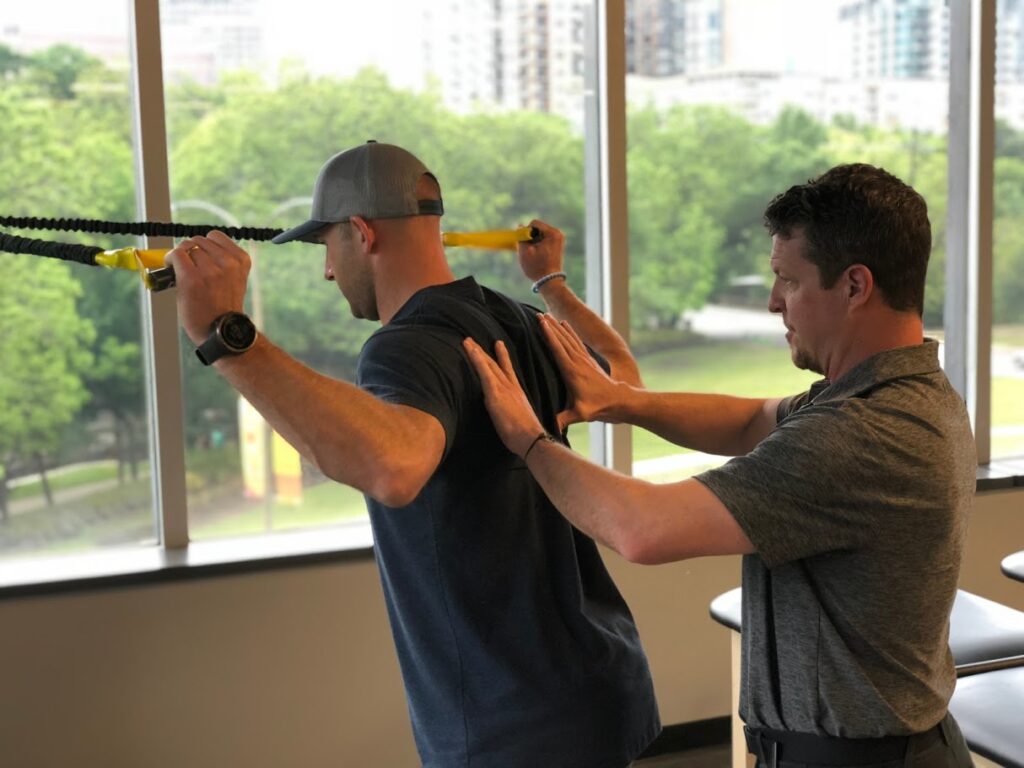IFPA Functional Trainer Specialist Certification Review (2025)
Read this IFPA Functional Trainer Specialist Certification Review to decide if the IFPA Functional Trainer Specialist Certification is worth it and what the best personal training certification is for you.

Welcome to our comprehensive review of the IFPA Functional Trainer Specialist Certification! In this IFPA Functional Trainer Certification Review, we will provide a detailed overview of the highly regarded IFPA Functional Fitness Trainer Certification, including its purpose, requirements, and benefits. We will also offer valuable insights and tips on how to prepare for the functional fitness certification exam, strategies for success, and the career opportunities that becoming a certified functional trainer can unlock.
Discover the ins and outs of the IFPA Functional Trainer Specialist Certification in this comprehensive review. Whether you want to learn how to become a personal trainer, or learn how to become a fitness influencer, or learn how to open a gym, or learn how to start a fitness business, or anything in between, use the Exercise.com platform to accomplish your fitness business goals.

You can start an online personal training business, make a fitness app, learn how to make money selling workout plans online, put in-person personal training marketing ideas into action, use personal training income ideas to find personal trainer career options that will put you on track for the highest paying fitness jobs, and many other ways to make money from fitness doing what you love.
With the Exercise.com platform you have the best online fitness coaching software and the best software for fitness influencers all in one! (Not to mention the best gym software and the best personal training software).
Create workout plans.

Manage clients.
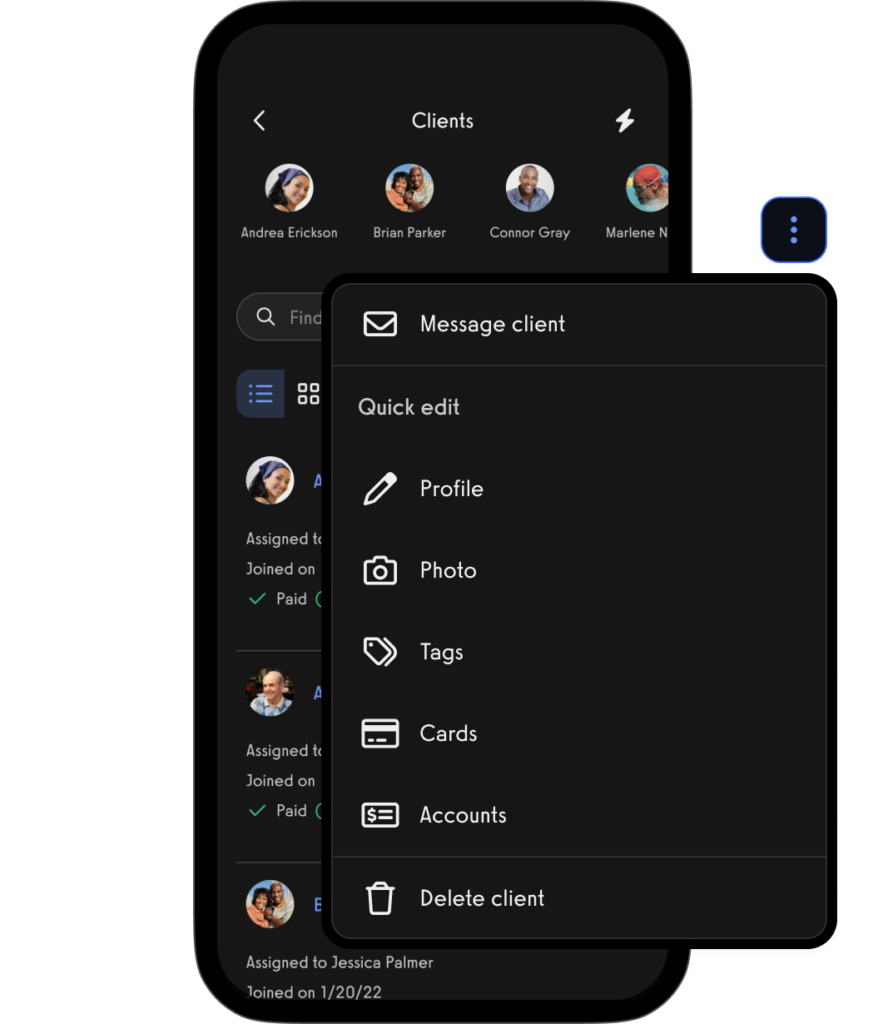
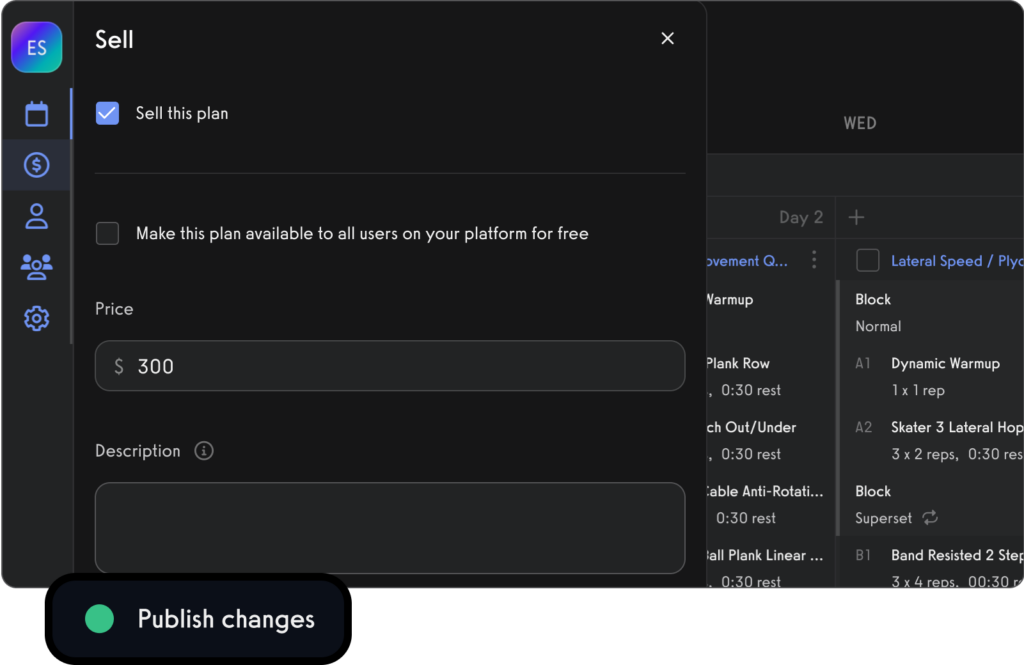
Run online fitness challenges.
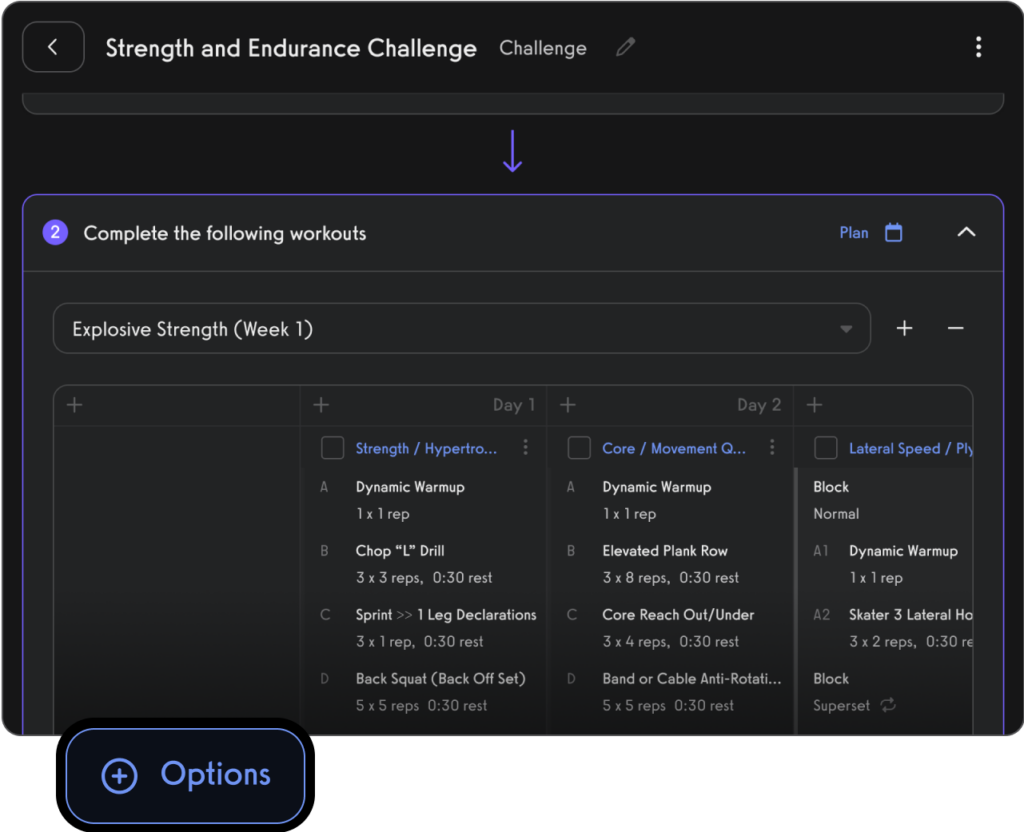
Create and sell fitness memberships, products, and digital offers.

Manage, message, and market to your online personal training clients and leads.
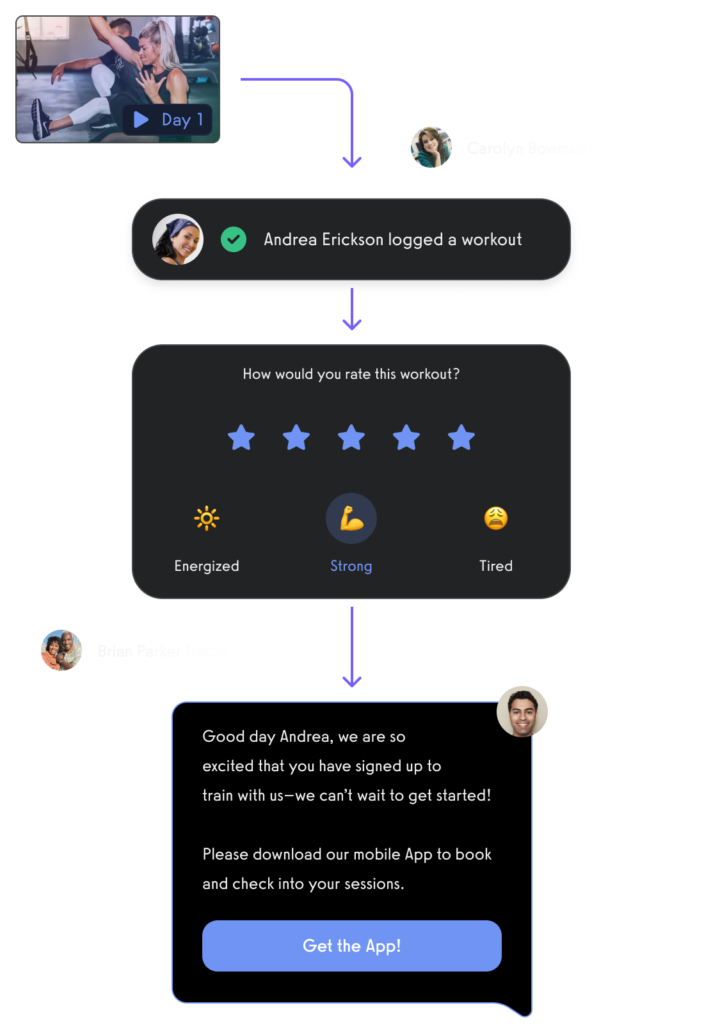
All from your very own custom branded fitness apps.

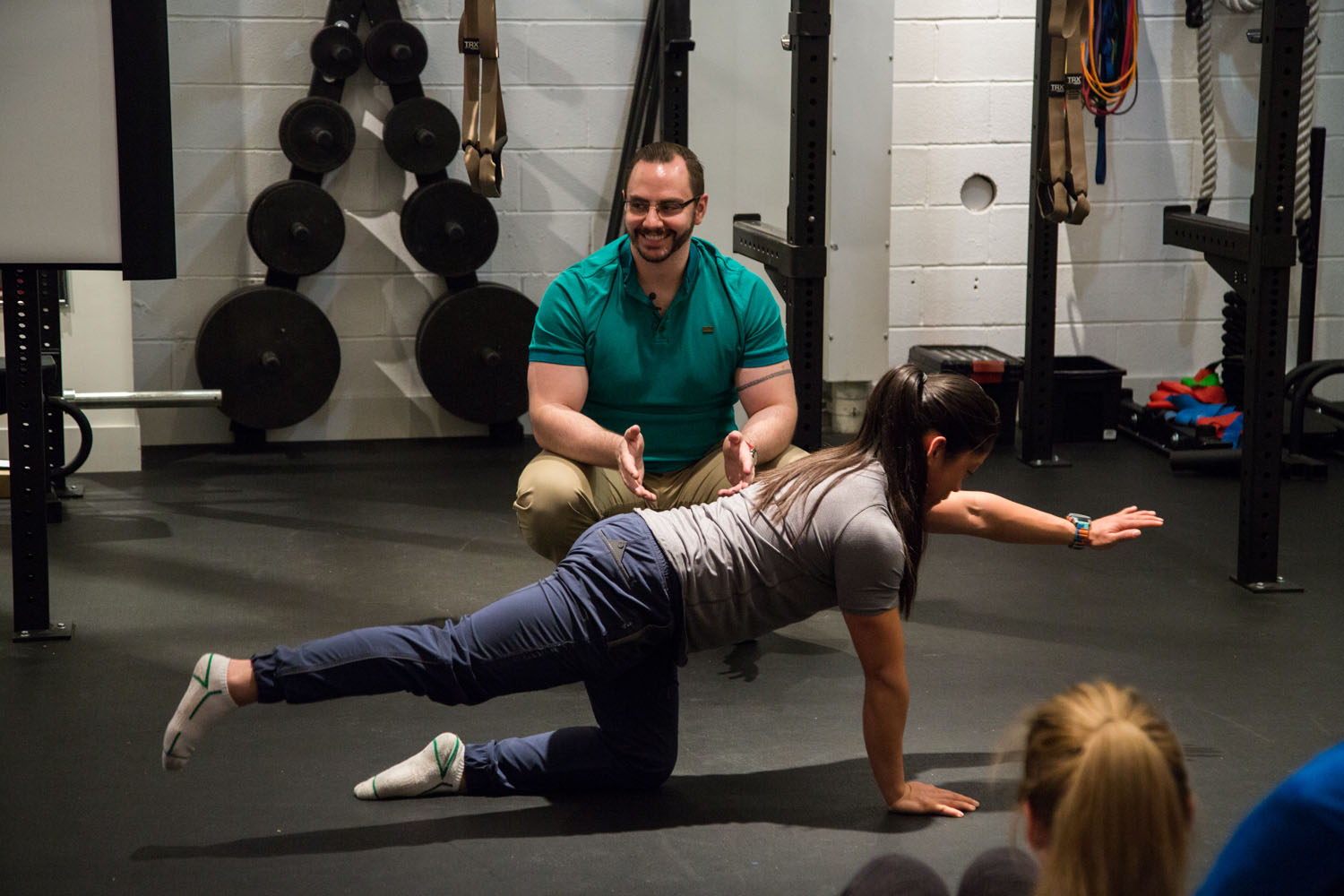
IFPA Functional Trainer Specialist Certification
The IFPA Functional Trainer Specialist Certification is a professional credential that validates an individual’s expertise in functional training. Functional training focuses on exercises that mimic real-life movements and improve overall fitness, strength, and flexibility. This certification demonstrates the ability to design and implement effective functional training programs.
The IFPA Functional Trainer Specialist Certification is crafted for fitness professionals aiming to excel in functional training, a method focused on preparing the body for real-life movements and activities. This certification, provided by the International Fitness Professionals Association (IFPA), delves into the principles of functional fitness, including assessment techniques, program design, and the integration of functional exercises to enhance daily living and athletic performance.
- Targeted at personal trainers, group exercise instructors, and rehabilitation professionals seeking to incorporate functional training methodologies into their practice.
- The curriculum emphasizes the understanding of functional movement patterns, the development of core stability, balance, mobility, and strength through functional exercises.
- Includes comprehensive study materials, practical workshops, and a certification exam, ensuring participants acquire both the theoretical knowledge and practical skills necessary for effective functional training.
- Graduates are well-prepared to design and deliver functional training programs that are personalized to meet the unique needs and goals of their clients, improving functional abilities, performance, and injury prevention.
IFPA Credibility and Reputation
The IFPA is known for its high standards in fitness education and certification programs, and the Functional Trainer Specialist Certification is no exception. Backed by IFPA’s reputation for quality, this certification ensures that professionals are recognized as knowledgeable and skilled in the field of functional training.
- Renowned for integrating the latest research and evidence-based practices into its curriculum.
- The certification is highly respected in fitness and health settings, enhancing the professional standing and opportunities for certified individuals.
- IFPA offers ongoing support and resources, including access to advanced training and a professional network, fostering an environment of continuous learning and expertise in functional training.
Achieving the IFPA Functional Trainer Specialist Certification signifies a professional’s dedication to mastering functional training, setting them apart as experts in this dynamic and effective fitness approach.
IFPA vs Other Top Functional Training Certifications
Comparing the IFPA Functional Trainer Specialist Certification to other leading functional training programs is essential to understand the unique features, focus areas, and applicability of each:
- IFPA Functional Trainer Specialist: Focuses on a comprehensive approach to functional training, covering assessment, program design, and a wide range of functional exercises suitable for various populations.
- Functional Movement Systems (FMS) Certification: Concentrates on the Functional Movement Screen as a tool for assessing movement patterns and identifying limitations, primarily used by fitness and rehabilitation professionals.
- National Academy of Sports Medicine (NASM) Corrective Exercise Specialist (CES): Targets corrective exercise strategies to improve movement efficiency and reduce the risk of injury, blending functional training principles with a rehabilitative approach.
- IFPA’s certification offers a broad and in-depth exploration of functional training, preparing professionals to apply these principles across a wide range of client needs and fitness goals.
- Certified professionals gain access to IFPA’s resources and ongoing education opportunities, ensuring they remain at the forefront of functional training practices.
- The certification equips fitness professionals with the skills to implement functional training programs that enhance daily functional abilities, athletic performance, and overall quality of life.
Choosing the right functional training certification depends on your career goals, training philosophy, and the specific needs of your clientele. The IFPA certification provides a comprehensive and versatile approach, making it an excellent choice for those looking to offer a wide range of functional training services.
Integrating functional training services with the best personal training software can greatly enhance a fitness professional’s ability to manage client programs, monitor progress, and deliver personalized and effective training plans, ensuring high-quality and tailored functional training experiences.
IFPA Cost
The investment in the IFPA Functional Trainer Specialist Certification reflects the depth of the curriculum and the professional value it brings to a fitness professional’s career. The cost includes access to detailed study materials, participation in practical workshops, and the certification examination.
- Program fees cover extensive training materials and workshops designed to provide a thorough understanding of functional training principles and their application.
- Opportunities for early registration discounts or bundle pricing with other IFPA certifications may be available, adding further value to the investment.
- The specialized skills and knowledge gained through the certification can lead to enhanced career opportunities and income potential in the growing field of functional fitness.
While the cost may be a significant consideration, the advanced specialization and professional development provided by the IFPA Functional Trainer Specialist Certification make it a worthwhile investment for fitness professionals committed to delivering high-quality, functional training services.
IFPA Functional Trainer Specialist Exam Content
The IFPA Functional Trainer Specialist Certification exam is structured to assess a candidate’s mastery of functional training concepts, including the analysis of functional movement patterns, the design of functional training programs, and the application of functional exercises to improve performance and prevent injuries. Key areas covered in the exam include:
Functional Movement Assessment
- Understanding of how to conduct functional movement assessments to identify limitations and asymmetries in movement patterns.
- Knowledge of using assessment results to inform the design of personalized functional training programs.
Program Design and Implementation
- Proficiency in developing functional training programs that address identified movement limitations and enhance movement efficiency, strength, balance, and mobility.
- Ability to integrate functional exercises into training programs that are tailored to the individual needs and goals of clients, ranging from everyday functional improvements to specific athletic performance enhancements.
Exercise Selection and Adaptation
- Skills in selecting and adapting functional exercises to suit various client abilities and goals, ensuring exercises are performed safely and effectively.
- Techniques for progressing and regressing functional exercises to match client development and ensure continuous improvement.
Successfully passing the certification exam demonstrates a fitness professional’s expertise in functional training, equipping them with the credentials to implement advanced, effective, and personalized functional training programs that enhance client mobility, performance, and overall well-being.
IFPA Functional Trainer Specialist Continuing Education and Recertification
Maintaining the IFPA Functional Trainer Specialist Certification requires a commitment to ongoing learning and professional development, ensuring that specialists stay informed about the latest advancements in functional training and its application:
- Continuing Education Units (CEUs): Certified specialists must complete a specified number of CEUs focused on functional training, fitness, or related subjects within each recertification cycle.
- Advanced Learning Opportunities: IFPA offers a selection of advanced courses, workshops, and seminars that delve deeper into functional training and related fitness disciplines, providing avenues for specialists to expand their knowledge and skills.
- Professional Growth: Recertification and continuous education reflect a specialist’s dedication to their professional development and to providing the highest quality functional training services to their clients.
Engaging in continuous professional development is crucial for functional training specialists to enhance their expertise, adapt to new findings in the field of functional training, and uphold the highest standards of practice in delivering effective and personalized functional training programs.
Other IFPA Offerings
In addition to the Functional Trainer Specialist Certification, IFPA provides a wide range of fitness certifications and educational opportunities that can complement a specialist’s expertise in functional training:
- Specialty Certifications: Such as the Strength and Conditioning Specialist or Flexibility Specialist, allowing functional trainers to broaden their training approaches and cater to a wide range of client needs and goals.
- Health and Wellness Certifications: Including the Nutrition Coach Certification or Wellness Coach Certification, equipping trainers with a holistic understanding of health and wellness to support their functional training programs.
- Continuing Education Courses: Covering a variety of topics from the latest in functional training techniques to holistic fitness approaches, supporting specialists in their ongoing professional development and innovation in training.
Exploring additional certifications and courses can enrich a functional training specialist’s practice, offering a comprehensive approach to fitness that incorporates the latest scientific insights and methodologies in functional training and beyond.
IFPA Functional Trainer Specialist Certification Overall Rating
The IFPA Functional Trainer Specialist Certification is an exceptional program for fitness professionals seeking to specialize in functional training, an increasingly popular and effective approach to fitness training. It provides an extensive exploration of functional training principles, movement assessments, program design, and the practical application of functional exercises.
Pros
- Advanced training in functional principles enhances specialists’ ability to design and implement targeted, safe, and effective functional training programs.
- The credibility of an IFPA certification enhances professional opportunities and recognition within the fitness and wellness industries, distinguishing certified specialists as experts in functional training.
- Access to ongoing educational resources and a supportive professional community fosters continuous learning and career development, ensuring specialists remain at the forefront of functional training practices.
Cons
- The certification requires a significant investment of time and financial resources, but the specialized expertise and professional benefits gained justify the cost and contribute to a specialist’s growth and success in the field.
- The focused nature of functional training may necessitate additional certifications or qualifications to comprehensively address the broadest range of client fitness needs and goals.
Overall, the IFPA Functional Trainer Specialist Certification is highly recommended for fitness professionals looking to deepen their expertise in functional training. It provides the advanced knowledge, skills, and credentials necessary to design and implement comprehensive functional training programs that improve client mobility, performance, and quality of life.
Integrating functional training services with the best personal training software can further enhance a specialist’s ability to manage client programs, track progress, and deliver tailored functional plans, ensuring a high-quality and personalized training experience for clients seeking to improve their functional abilities and overall fitness.
Functional training has gained popularity in recent years due to its practical approach to fitness. Unlike traditional weightlifting exercises that isolate specific muscle groups, functional training incorporates movements that engage multiple muscle groups and joints. This type of training not only improves overall strength but also enhances coordination, balance, and stability.
Functional training exercises often involve the use of equipment such as resistance bands, stability balls, kettlebells, and medicine balls. These tools add an element of instability, forcing the body to engage more muscles to maintain proper form and control. By incorporating functional training into their fitness routines, individuals can improve their performance in everyday activities and reduce the risk of injury.
Understanding the purpose and benefits of the certification
The primary purpose of the IFPA Functional Trainer Specialist Certification is to enhance the knowledge and skills of fitness professionals specializing in functional training. By earning this certification, professionals can gain recognition for their expertise and demonstrate their commitment to providing high-quality functional training services.
In addition to professional recognition, the IFPA Functional Trainer Specialist Certification offers several benefits to certified individuals. One of the key benefits is the opportunity to work with a wide range of clients seeking functional fitness training. Functional training is suitable for individuals of all fitness levels and ages, including athletes, older adults, and those recovering from injuries. With this certification, fitness professionals can tailor their programs to meet the specific needs and goals of their clients.
Moreover, this certification opens up a range of career opportunities in the fitness industry. It can lead to increased job prospects, higher earning potential, and the ability to work with diverse populations seeking functional fitness training. As functional training continues to gain popularity, certified specialists are in high demand, both in fitness centers and private training studios.
Overview of the certification requirements and process
To become an IFPA Functional Trainer Specialist, candidates must meet specific requirements. These include holding a valid personal trainer certification from a recognized organization, completing the functional trainer specialist course, and passing the certification exam.
The functional trainer specialist course provides in-depth knowledge of functional training principles, exercise techniques, program design, injury prevention, and client assessment. It covers a wide range of topics, including the science behind functional training, effective coaching strategies, and how to modify exercises for individuals with different abilities or limitations.
During the course, candidates learn about the various tools and equipment used in functional training and how to incorporate them into training programs. They also gain practical experience through hands-on exercises and case studies, allowing them to apply their knowledge in real-world scenarios.
Once candidates have completed the course, they are eligible to take the certification exam. The exam evaluates candidates’ understanding of functional training concepts and their ability to apply them in practical scenarios. It consists of multiple-choice questions and practical assessments to ensure that candidates have the necessary skills to design and implement effective functional training programs.
Upon passing the exam, candidates earn the IFPA Functional Trainer Specialist Certification, which is valid for a certain period of time. To maintain their certification, specialists must fulfill continuing education requirements and stay up to date with the latest advancements in functional training.
Preparing for the IFPA Functional Trainer Specialist Certification
If you aspire to become an IFPA Functional Trainer Specialist, it is crucial to adequately prepare for the certification. Here are some recommended prerequisites and qualifications to consider:
Recommended prerequisites and qualifications
- Hold a valid personal trainer certification
- Possess a solid foundation in exercise science and physiology
- Demonstrate proficiency in functional training principles
- Have experience working with clients in functional training settings
These prerequisites and qualifications ensure that candidates have the necessary foundation to excel in the functional trainer specialist course and certification exam.
Study materials and resources for exam preparation
When preparing for the IFPA Functional Trainer Specialist Certification, it is essential to gather the right study materials and resources. These can include textbooks, online courses, study guides, and practice exams specifically designed for this certification.
Make use of reputable resources that cover all the exam topics comprehensively. It is also recommended to participate in workshops or seminars led by experienced functional training professionals to gain practical insights and knowledge.
Textbooks are a valuable resource for studying the theoretical aspects of functional training. Look for textbooks that cover exercise science, anatomy, physiology, biomechanics, and kinesiology. These subjects provide a solid foundation for understanding the human body’s response to functional training exercises.
Online courses are another excellent option for exam preparation. Many reputable organizations offer online courses that are specifically tailored to the IFPA Functional Trainer Specialist Certification. These courses typically include video lectures, interactive quizzes, and downloadable study materials to enhance your learning experience.
Study guides are handy tools that condense the essential information into a concise and organized format. They often include key concepts, definitions, and practice questions to help you review and reinforce your knowledge. Look for study guides that align with the exam content outline provided by the IFPA to ensure you cover all the necessary topics.
Practice exams are crucial for assessing your readiness for the certification exam. They simulate the actual exam experience and allow you to gauge your knowledge and identify areas that require further study. Practice exams also help you become familiar with the format and structure of the questions, improving your test-taking skills.
In addition to self-study materials, consider attending workshops or seminars conducted by experienced functional training professionals. These events provide opportunities to learn from industry experts, ask questions, and gain practical insights into functional training techniques and methodologies. Networking with fellow fitness professionals at these events can also be beneficial for sharing knowledge and experiences.
Remember, adequate preparation is key to success in any certification exam. Dedicate sufficient time and effort to studying and practicing the necessary skills. By following the recommended prerequisites, utilizing the right study materials, and seeking practical insights, you will be well-prepared to excel in the IFPA Functional Trainer Specialist Certification.
The Content and Format of the IFPA Functional Trainer Specialist Certification Exam
The IFPA Functional Trainer Specialist Certification Exam is a comprehensive assessment that evaluates candidates’ knowledge and understanding of functional training. It consists of several sections, each covering different topics related to functional training. Understanding the breakdown of these sections and the topics covered is crucial to perform well in the exam.
Breakdown of the exam sections and topics covered
The exam is typically divided into four sections, each designed to assess candidates’ understanding of specific aspects of functional training:
- Anatomy and Biomechanics: This section focuses on the intricate relationship between the human body’s structure and function. Candidates will be tested on their knowledge of the musculoskeletal system, joint mechanics, and how these factors influence functional training exercises.
- Functional Training Principles and Concepts: In this section, candidates will be examined on their understanding of the fundamental principles and concepts that underpin functional training. Topics covered may include movement patterns, functional movement assessments, and the integration of different training modalities.
- Exercise Program Design for Various Populations: This section explores the art and science of designing effective functional training programs for different populations. Candidates will be expected to demonstrate their knowledge of program variables, progression and regression techniques, and considerations for specific populations such as athletes, older adults, and individuals with injuries or limitations.
- Injury Prevention and Safety Considerations: Safety should always be a top priority in functional training. This section assesses candidates’ understanding of injury prevention strategies, proper technique and form, equipment safety, and the ability to identify and address potential risks or contraindications.
Candidates should dedicate sufficient study time to each section, ensuring they are well-versed in the underlying theories, practical applications, and best practices. A strong grasp of these topics will not only enhance their performance in the exam but also equip them with the knowledge and skills necessary to excel as a Functional Trainer Specialist.
Exam format and time constraints
The IFPA Functional Trainer Specialist Certification Exam is typically administered online and has a specific time limit. It consists of multiple-choice questions that assess candidates’ knowledge and ability to apply functional training principles in practical scenarios.
Candidates should familiarize themselves with the exam format and practice answering sample questions within the allocated time to develop their pacing and time management skills. By simulating the exam environment, candidates can enhance their ability to think critically, make informed decisions, and effectively communicate their understanding of functional training concepts.
Successfully passing the IFPA Functional Trainer Specialist Certification Exam demonstrates a high level of expertise and competency in functional training, opening up opportunities for career advancement and establishing credibility within the fitness industry.
Tips and Strategies for Success in the IFPA Functional Trainer Specialist Certification Exam
Preparation is key when aiming for success in the IFPA Functional Trainer Specialist Certification Exam. Here are some effective tips and strategies to help you maximize your potential:
Effective study techniques and time management
Develop a study schedule that allows ample time for understanding each exam section thoroughly. Break down your study sessions into manageable periods and focus on one topic at a time. Incorporate a mix of reading, practicing sample questions, and reviewing detailed explanations.
Additionally, consider using mnemonic devices to aid in memorization. These memory aids can be acronyms, rhymes, or visual associations that help you recall important information during the exam.
Furthermore, take advantage of various study techniques such as creating flashcards, recording verbal explanations, or teaching the material to someone else. These approaches can enhance retention and understanding. Explaining concepts to others not only solidifies your own understanding but also allows you to identify any gaps in your knowledge.
Moreover, consider joining study groups or finding a study partner. Collaborating with others can provide different perspectives and insights, as well as help motivate and keep you accountable.
Common pitfalls to avoid during the exam
During the exam, it is important to remain calm and focused. Avoid spending excessive time on challenging questions. Instead, answer the questions you are confident about first and revisit the more difficult ones later. By answering the easier questions first, you can build momentum and boost your confidence for the tougher ones.
Read each question carefully, paying attention to qualifying words such as “not,” “always,” and “except.” These words can drastically change the meaning of a question and its answer choices. Taking the time to thoroughly understand what each question is asking will help you avoid careless mistakes.
Don’t rush through the exam but also be mindful of the time constraints. Allocate time based on the number of questions and ensure you answer all of them to the best of your ability. Pace yourself accordingly and avoid getting stuck on a single question for too long. If you’re unsure about an answer, make an educated guess and flag it for review if time allows.
Another common pitfall to avoid is second-guessing yourself. Trust your preparation and instincts. Overthinking can lead to doubt and potentially incorrect answers. Stick to your initial response unless you have a valid reason to change it.
Lastly, make sure to manage your physical and mental well-being leading up to the exam. Get enough sleep, eat nutritious meals, and engage in stress-reducing activities such as exercise or meditation. Taking care of your overall health will help you perform at your best during the exam.
Benefits and Career Opportunities of the IFPA Functional Trainer Specialist Certification
Earning the IFPA Functional Trainer Specialist Certification can greatly enhance your professional credibility and open up numerous career opportunities within the fitness industry.
How the certification enhances professional credibility
By attaining the IFPA Functional Trainer Specialist Certification, you demonstrate your dedication to continuous learning and professional development. Clients and employers value certifications from reputable organizations, which can elevate your status and distinguish you from other fitness professionals.
Job prospects and potential salary increase with the certification
The fitness industry is constantly evolving, with a growing demand for specialized trainers. Holding the IFPA Functional Trainer Specialist Certification can lead to increased job prospects, especially in facilities that emphasize functional training.
Additionally, this certification might provide leverage when negotiating salary or seeking promotions within your current workplace. Employers recognize the added value that certified specialists bring to their teams, making them more likely to offer competitive compensation packages.
Additional resources and support for aspiring candidates
For detailed information about the IFPA Functional Trainer Specialist Certification, including registration, study materials, and online courses, visit the official IFPA website. They provide comprehensive resources and support to help candidates navigate the certification process with confidence.
The IFPA Functional Trainer Specialist Certification is an excellent choice for fitness professionals looking to specialize in functional training. By obtaining this prestigious credential, professionals can enhance their knowledge, career prospects, and earning potential. Remember to thoroughly prepare for the certification exam by leveraging recommended study materials, implementing effective study techniques, and familiarizing yourself with the exam format. The IFPA Functional Trainer Specialist Certification can undoubtedly elevate your professional development and open doors to exciting opportunities within the fitness industry. Start your journey and unlock your potential today!
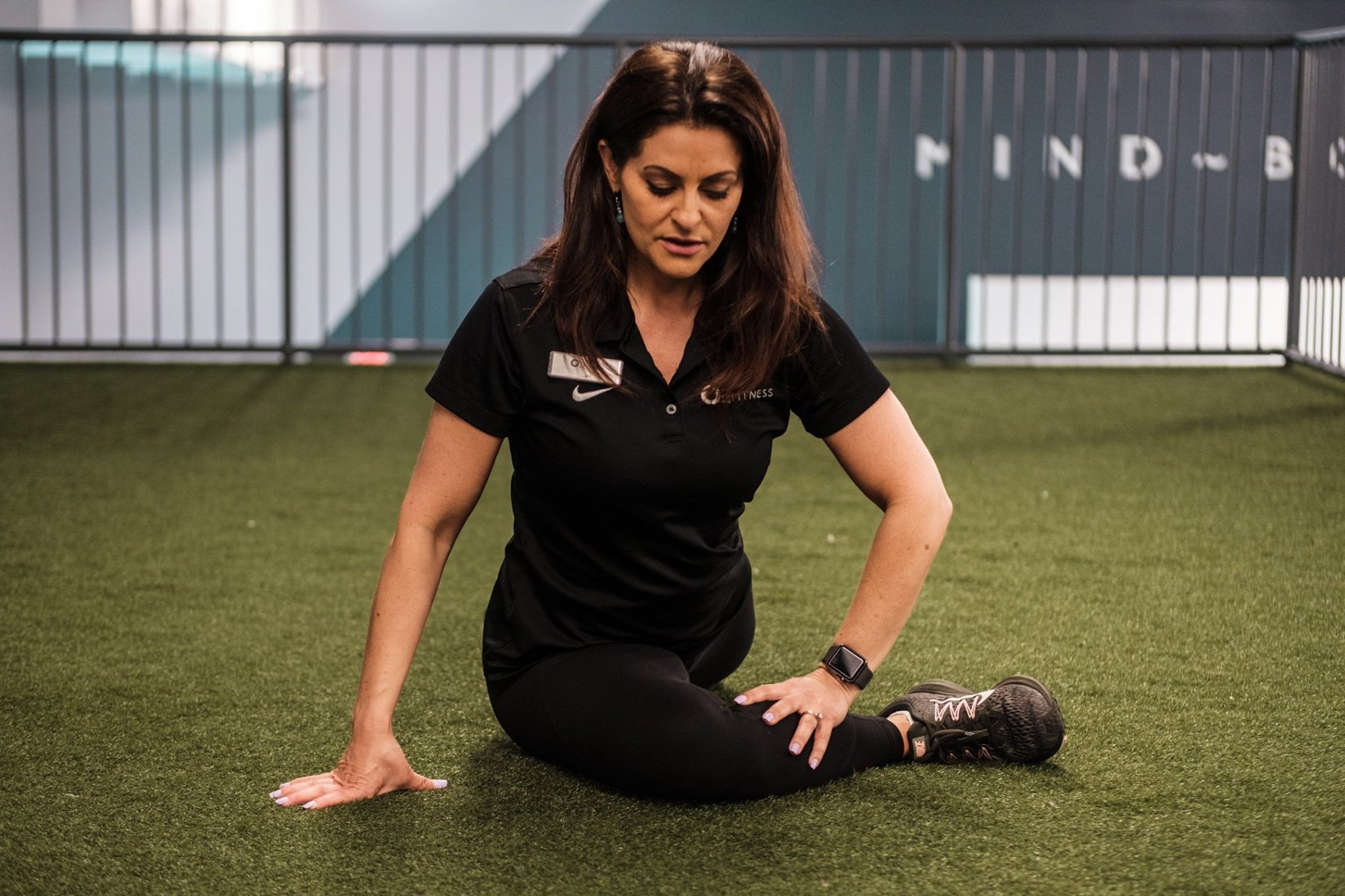
How long does it take to complete the IFPA Functional Trainer Specialist Certification?
The duration varies depending on individual study habits and prior knowledge. On average, candidates complete the certification within 3-6 months.
Can I pursue the IFPA Functional Trainer Specialist Certification if I have minimal experience in functional training?
It is recommended to have a solid foundation in basic exercise science and some experience in functional training settings before pursuing the certification.
What is the IFPA Functional Trainer Specialist Certification?
The IFPA Functional Trainer Specialist Certification is designed for fitness professionals seeking to deepen their expertise in functional training—a training approach that emphasizes exercises that improve daily living activities, enhance sports performance, and prevent injuries. This certification covers the principles of functional fitness, assessment techniques to determine functional capacities, program design tailored to individual needs and goals, and corrective exercise strategies. It’s aimed at personal trainers, group fitness instructors, physical therapists, and athletic coaches who want to integrate functional training methodologies into their practice.
Is the IFPA Functional Trainer Specialist Certification worth it?
Yes, the IFPA Functional Trainer Specialist Certification is worth it for professionals focused on providing holistic and practical fitness solutions that translate to real-world and sports-specific movements. This certification can enhance your ability to design and implement training programs that are not only effective in achieving fitness goals but also in improving clients’ quality of life and athletic performance. It can also distinguish you as a specialist in functional training, potentially expanding your client base and career opportunities.
Who should get the IFPA Functional Trainer Specialist Certification?
The IFPA Functional Trainer Specialist Certification is ideal for:
- Personal trainers looking to incorporate functional training principles into their client sessions for more dynamic and applicable fitness routines.
- Group fitness instructors aiming to design classes that improve functional strength, mobility, and endurance.
- Athletic coaches seeking to enhance their athletes’ performance through functional movement patterns and exercises.
- Rehabilitation professionals, such as physical therapists, interested in using functional training techniques as part of their rehabilitation programs.
How difficult is the IFPA Functional Trainer Specialist exam?
The difficulty of the IFPA Functional Trainer Specialist exam can vary based on an individual’s familiarity with functional training concepts, assessment protocols, and program design strategies tailored to improving functional capacities. A solid understanding of these areas, coupled with practical experience in applying functional training techniques, is essential for success. Candidates should thoroughly study the IFPA’s materials and possibly seek hands-on experience to prepare for the exam effectively.
How credible is IFPA?
The IFPA is recognized for its dedication to providing comprehensive and scientifically-backed certification programs in the fitness industry. The Functional Trainer Specialist Certification, like all IFPA certifications, is developed by experts in the field and is based on the latest research and best practices in functional training. This ensures that certified professionals are well-equipped with current knowledge and skills, enhancing the credibility of their services.
How many people pass the IFPA Functional Trainer Specialist exam on the first try?
Specific pass rate statistics for the IFPA Functional Trainer Specialist exam are not publicly available. However, thorough preparation using the IFPA’s study materials and practical application of functional training principles typically increase the likelihood of passing the exam on the first attempt.
What is the pass rate of the IFPA Functional Trainer Specialist exam?
The IFPA does not publicly share specific pass rate data for the Functional Trainer Specialist exam. Pass rates can vary based on candidates’ backgrounds, study habits, and understanding of functional training principles. Focused study and practical experience in functional training can significantly improve a candidate’s chances of success.
How does IFPA compare to other organizations for functional training certification?
When comparing IFPA to other organizations offering functional training certifications, consider the curriculum’s comprehensiveness, the focus on evidence-based practices, and the certification’s recognition within the fitness industry. The IFPA’s Functional Trainer Specialist Certification is notable for its emphasis on practical application and integration of functional training into various fitness and rehabilitation settings, making it a valuable choice for professionals in this field.
Is the IFPA Functional Trainer Specialist test open book?
Typically, the IFPA Functional Trainer Specialist exam is not open book. It is designed to assess the candidate’s in-depth knowledge of functional training principles and their ability to apply this knowledge in designing effective training programs without the aid of reference materials.
How many times can you fail the IFPA exam?
IFPA allows candidates to retake the Functional Trainer Specialist exam if they do not pass on their first attempt. Retake policies, including any associated fees and waiting periods, should be confirmed directly with IFPA for the most current information.
What can I do with an IFPA Functional Trainer Specialist Certification?
With this certification, you can:
- Design and implement functional training programs for clients of all fitness levels, improving their ability to perform daily activities and excel in sports.
- Offer specialized functional training services that address specific needs, such as injury prevention, rehabilitation, or performance enhancement.
- Conduct functional training workshops or seminars to educate clients and other fitness professionals on the benefits and methodologies of functional training.
- Collaborate with healthcare providers to integrate functional training into comprehensive wellness and rehabilitation plans.
How much does the IFPA Functional Trainer Specialist Certification cost?
The cost of the IFPA Functional Trainer Specialist Certification may vary based on factors such as required study materials, workshops, and exam fees. Prospective candidates should check the IFPA’s official website or contact IFPA directly for the most accurate and current pricing information.
What are the best personal training certifications?
The best personal training certifications, including specialized ones like the IFPA Functional Trainer Specialist Certification, are those that offer a comprehensive curriculum, recognized accreditation, and a focus on evidence-based practices. Other top certifications to consider are:
- NASM Certified Personal Trainer for its emphasis on the OPT model.
- ACE Certified Personal Trainer for its holistic approach to client wellness.
- NSCA Certified Strength and Conditioning Specialist for individuals focused on athletic performance.
- ACSM Certified Personal Trainer for its strong foundation in exercise science.
Selecting the best certification depends on your specific career goals, the populations you wish to serve, and your interest in areas like functional training.
